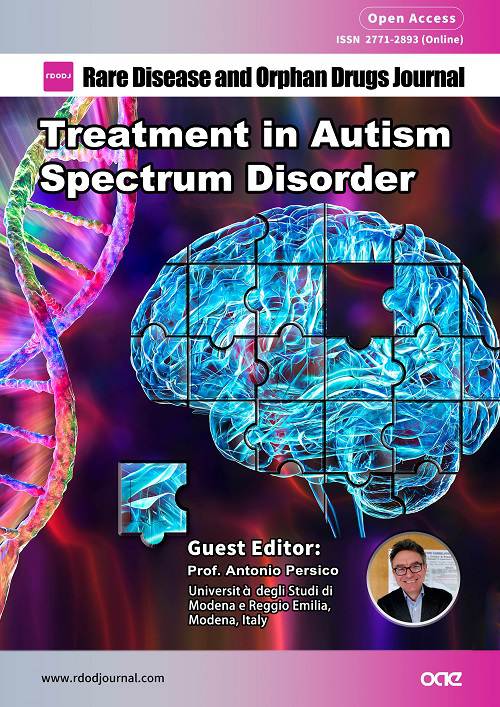
Topic: Treatment in Autism Spectrum Disorder
A Special Issue of Rare Disease and Orphan Drugs Journal
ISSN 2771-2893 (Online)
Submission deadline: 30 Jun 2024
Guest Editor(s)
Special Issue Introduction
Autism spectrum disorder (ASD) is a neurodevelopmental condition with onset in early childhood, characterized by deficits in social interaction and communication, insistence on sameness, stereotypic behaviors, restricted interests and abnormal sensory processing. Its prevalence has risen during the last three decades from 2-5/10,000 to 1:50-1:80 children. ASD encompasses a collection of neurodevelopmental conditions sharing these behavioral hallmarks, but otherwise extremely heterogenous in developmental trajectory, response to treatment, cognitive level, language development, and etiopathogenetic underpinnings. Pharmacological treatments display some efficacy on co-morbid conditions often associated with ASD, such as aggression and irritability, attention deficit/hyperactivity disorder, and sleep disorders. The lack of pharmacological compounds endowed with efficacy on core autism symptoms is felt as one of the most critical unmet needs in Child & Adolescent Neuropsychiatry.
The search for novel pharmacological agents able to ameliorate autistic symptoms has initially taken its move from syndromic forms of ASD, i.e., known monogenic syndromes frequently associated with autism (for example, Fragile-X syndrome, Phelan-McDermid syndrome, etc.). The purported linear connection between "one gene - one mechanism - one syndrome", the availability of animal models to study the pathophysiology of these monogenic forms of ASD, the astonishing reversal of behavioral, anatomic and neurophysiological abnormalities recorded in rodent models following the administration of drugs targetting specific pathophysiological mechanisms, has spurred interest into experimental drug treatments of monogenic forms of ASD, with the aim of later extending these interventions to patient populations with more heterogeneous forms of idiopathic ASD. This strategy has yielded mixed results at best, and frequently much disappointment: on the one hand, the human brain appears a lot less "permissive" than the rodent brain when it comes to correcting neurodevelopmental abnormalities established early on during brain development; on the other hand, not even monogenic forms of ASD are clinically and neurobiologically as homogeneous as expected in humans; finally, randomized controlled trials (RCTs) of experimental drugs have generally recorded major improvements in a minority of autistic patients, with the majority displaying little or no effect. Not surprisingly, the final outcome of large phase-III studies has been negative, possibly because no strategy was in place to characterize responders and to later design RCTs targetting this "likely-to-respond" subgroup of patients.
This Special Issue on "Treatment in Autism Spectrum Disorder" aims to collect high-profile contributions addressing this complex field with a focus on:
● The development of novel experimental drug treatments for rare monogenic syndromes frequently associated with autism;
● Specific experimental drugs currently under scrutiny for ASD;
● Animal models: their characteristics, strengths and translational limitations in pharmacological studies of ASD;
● The methodological challenges in designing and carrying out pharmacological studies in neurodevelopmental conditions like ASD;
● Biomarker-based strategies for the characterization of "likely-to-respond" patients, in order to develop personalized and targeted therapies;
● Genetically-guided personalized drug therapies in neurodevelopmental conditions and ASD;
● Regulatory issues in drug development for ASD;
● The perspective of the pharmaceutical industry on drug development for neurodevelopmental disorders and for rare syndromes.
The search for novel pharmacological agents able to ameliorate autistic symptoms has initially taken its move from syndromic forms of ASD, i.e., known monogenic syndromes frequently associated with autism (for example, Fragile-X syndrome, Phelan-McDermid syndrome, etc.). The purported linear connection between "one gene - one mechanism - one syndrome", the availability of animal models to study the pathophysiology of these monogenic forms of ASD, the astonishing reversal of behavioral, anatomic and neurophysiological abnormalities recorded in rodent models following the administration of drugs targetting specific pathophysiological mechanisms, has spurred interest into experimental drug treatments of monogenic forms of ASD, with the aim of later extending these interventions to patient populations with more heterogeneous forms of idiopathic ASD. This strategy has yielded mixed results at best, and frequently much disappointment: on the one hand, the human brain appears a lot less "permissive" than the rodent brain when it comes to correcting neurodevelopmental abnormalities established early on during brain development; on the other hand, not even monogenic forms of ASD are clinically and neurobiologically as homogeneous as expected in humans; finally, randomized controlled trials (RCTs) of experimental drugs have generally recorded major improvements in a minority of autistic patients, with the majority displaying little or no effect. Not surprisingly, the final outcome of large phase-III studies has been negative, possibly because no strategy was in place to characterize responders and to later design RCTs targetting this "likely-to-respond" subgroup of patients.
This Special Issue on "Treatment in Autism Spectrum Disorder" aims to collect high-profile contributions addressing this complex field with a focus on:
● The development of novel experimental drug treatments for rare monogenic syndromes frequently associated with autism;
● Specific experimental drugs currently under scrutiny for ASD;
● Animal models: their characteristics, strengths and translational limitations in pharmacological studies of ASD;
● The methodological challenges in designing and carrying out pharmacological studies in neurodevelopmental conditions like ASD;
● Biomarker-based strategies for the characterization of "likely-to-respond" patients, in order to develop personalized and targeted therapies;
● Genetically-guided personalized drug therapies in neurodevelopmental conditions and ASD;
● Regulatory issues in drug development for ASD;
● The perspective of the pharmaceutical industry on drug development for neurodevelopmental disorders and for rare syndromes.
Submission Deadline
30 Jun 2024
Submission Information
For Author Instructions, please refer to https://www.oaepublish.com/rdodj/author_instructions
For Online Submission, please login at https://oaemesas.com/login?JournalId=rdodj&IssueId=rdodj221226
Submission Deadline: 30 Jun 2024
Contacts: Cyndi Guan, Assistant Editor, assistant_editor@rdodjournal.com






